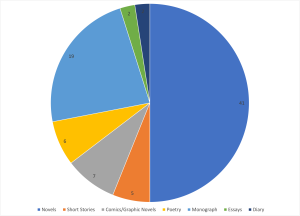Third week of the year and I am already behind schedule. Oh well.
Film: Columbite/Tantalite dir. Chiwetel Ejiofor
Coltan, or columbite/tantalite, is a mineral which is valued for small electronics because it can hold an electrical charge well (that is, it has high capacitance) without heating up. It is in your phone, your laptop, pretty much anything that has a CPU and RAM but is smaller than a full-size desktop computer. The Democratic Republic of the Congo has very nearly all of the world’s known supply of coltan, and it has at times been more valuable than gold. So, not surprisingly, it has been at the center of much of the conflict in the DRC. This short film, directed by Chiwetel Ejiofor (star of 12 Years a Slave, among other things) deals with the problem of coltan and other “conflict minerals” in a beautiful if elliptical way; it doesn’t really preach at you (though some of Tom Hughes’s dialogue is a little on the nose), but it makes it clear that, in a globalized economy, consumer choices have costs that we are often unaware of. At the same time, it shows that choices are being made on what we might call the supply side as well.
Article: “A Toast Story” by John Gravois
This is an article about “hipster toast,” which is to say that it seeks to explain how it came to be that people in (mostly) San Francisco began paying $3-4 for a slice of cinnamon-sugar toast. Really, I should say, that’s how it starts out; it quickly becomes something much more interesting, focusing on a mentally ill woman who uses her business as a means of staying connected to the world and dealing with her illness. Really: the premise is not all that promising, but the story is pretty remarkable.
That said, $3 is still too much to pay for a slice of damn toast.
Article: “Chris Christie and Pulling the Red Handle” by Linda Holmes
Chris Christie is fat. It is possible that you know nothing about him other than this; people make a lot of jokes about his weight, and every time his name comes up as a possible presidential candidate, somebody asks whether his weight will be a problem.
Linda Holmes discusses the tendency to talk about Christie and his weight, and obesity more generally, in terms of “self control” or “will power” or “discipline,” and the fact that putting it in those terms authorizes a degree of criticism and mockery that is unacceptable in other contexts. It’s a startlingly candid piece of writing, and a good reminder that, until you actually know a person, you really have very little idea why they are they way the are or do what they do.
Article: “The iPod of Prison” by Joshua Hunt
For years, the most popular way to listen to music in American prisons has been the euphoniously-named Sony SRF-39FP radio. It is cheap, and it runs for 40 hours on a single AA battery. It is manufactured by Sony specifically for the prison market, which gets at one of the most interesting aspects of this piece: there is a prison market. Inmates can spend a limited amount of money every month in prison commissaries, which are run and stocked by private corporations that contract with federal or state governments for the job. Now, there is a slow movement away from the radio and toward mp3 players, and with that companies are being created specifically to sell mp3s to inmates (who can only by songs that have been approved by prison officials). This isn’t really Hunt’s focus, but combined with the increasing privatization of the prisons themselves, i have to wonder about whether tree are perverse incentives being created here.
Article: “The Death of Expertise” by Tom Nichols
There are certain things— few in number and of interest to very few people, but still— about which I could probably be called an expert. Nationalism, or U.S. Indian policy, for instance. What that means is that I have read, thought, and written about these things much more than most people. One might generally expect, as a result of this, that in a discussion of those topics, my opinion would carry more weight than that of a person without this knowledge. But, Tom Nichols suggests, this is increasingly not the case; more and more, the idea that greater knowledge or experience matters is being undermined by the notion that everybody is entitled to their opinion. He doesn’t really explain this phenomenon in any satisfactory way, and he explicitly says that there is nothing we can really do about it but wait for the tide to turn back the other way, so I like this piece not so much for its special insight as for the way it validates my own frustrations.
Article: “The Online Avengers” by Emily Bazelon
Speaking of experts, Emily Bazelon has become something of an expert on bullying, and one of the most difficult aspects of that issue is the question of what exactly yo do to/about the bullies, who are, after all, children themselves. This story is about an extreme version of the problem: girls who have been raped or sexually assaulted by their peers, and then find the authorities unsympathetic or unwilling to pursue charges against their attackers. In several such cases, online vigilantes (and I now hereby coin the term “digilantes” ) have taken it upon themselves to pressure police and other officials to do more, including by revealing the identities of the accused. Some of what they do is illegal, particularly hacking into Facebook accounts and other sources of personal data in order to uncover identifying information. Bazelon asks whether this is something to be lauded or not, but the piece makes no real attempt to answer that question. At the very least, these acts suggest that there are holes in the legal system with regard to sexual assault, but we knew that; the question is whether and how we can do anything about that without compromising the legal rights of the accused.
Video: “Says” by Nils Frahm
On a lighter note: a beautiful piece that slowly layers minimal elements into something quite moving.


